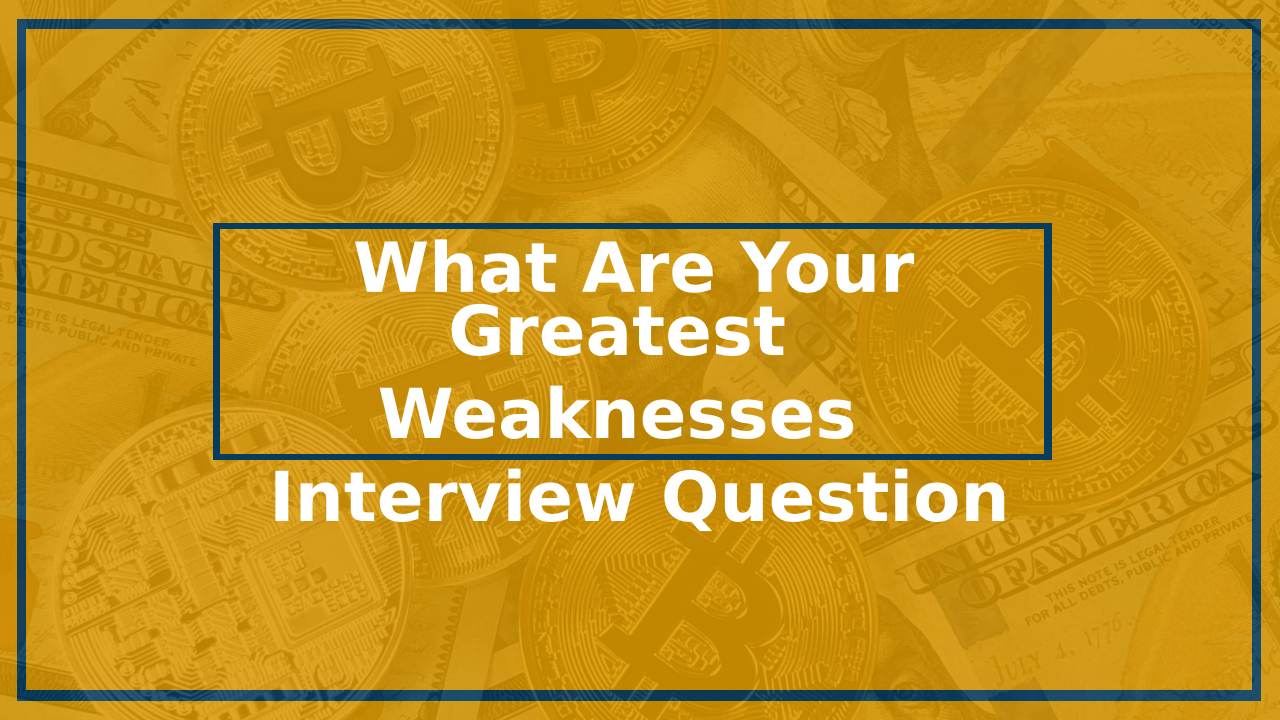How to Identify Your Weaknesses for Job Interviews

When it comes to job interviews, one of the most dreaded questions is, “What is your greatest weakness?” It’s a tricky question that can make or break your chances of getting the job. But fear not; with some preparation, you can turn this question into an opportunity to showcase your self-awareness and growth mindset. Here are some tips on how to identify your weaknesses for job interviews:
- Check the job description and rule out any listed skills – Before the interview, take some time to carefully review the job description and make a list of the skills and responsibilities required for the position. When identifying your weaknesses, exclude any skill listed as a requirement for the job. For instance, if the job requires strong communication skills, don’t mention communication as a weakness. This will only make you appear less qualified.
- Consider past weaknesses that you’ve overcome. – Reflect on your work experience and identify areas where you struggled in the past but have since improved. This can demonstrate your ability to learn and grow from challenges. For example, you can talk about how you initially found it difficult to lead a team but have since taken leadership courses and gained valuable experience that has made you a better leader.
- Look through old performance reviews for inspiration. – Another way to identify your weaknesses is to review your past performance reviews and self-assessments. These documents can provide valuable feedback on areas where you need improvement. Be honest and choose a weakness you are actively working on or plan to improve. This will show the interviewer that you are self-aware and take the initiative to develop yourself.
Crafting Your Answer to “What is My Greatest Weakness”
Now that you have identified your weakness, it’s time to craft your answer. Make sure to use positive language and emphasize how you have worked to overcome your weakness. Here are a few examples:
- “In the past, I struggled with public speaking. However, I recognized the importance of this skill in my role and took a public speaking course. Now, I feel much more confident presenting in front of groups.”
- “One area that I have been actively working on is time management. I have started using productivity tools to prioritize my tasks better and set realistic deadlines. This has greatly improved my efficiency and productivity.”
- “Initially in my career, I had difficulty managing multiple projects simultaneously. However, I have since developed a system for organizing my workload and have become much more proficient in multitasking.”
How to Answer “What is Your Greatest Weakness?” in a Job Interview
As a job candidate, one of the most challenging interview questions to answer is, “What is your greatest weakness?” This question requires careful thought and preparation to avoid pitfalls hindering your chances of getting the job. Here are some tips on how to answer this question effectively:
Choose a weakness that won’t affect your job performance.
When selecting a weakness to discuss, ensure it will ensure you succeed in the role you’re applying for. For instance, if you’re applying for a job as a writer, don’t mention that you struggle with writing. Instead, choose a weakness unrelated to the job, such as public speaking.
- Be honest and genuine. – It’s essential to be honest when discussing your weaknesses in an interview. Avoid giving a scripted or generic answer that lacks sincerity. Instead, choose a genuine flaw that you’re actively working to improve.
- Provide an example of how you’re improving. – After discussing your weakness, provide an example of how you’re taking steps to improve. This could be by taking classes, seeking mentorship, or practicing independently. Be specific and demonstrate that you’re actively addressing the weakness.
- Demonstrate self-awareness and a growth mindset. – This question aims to see your self-awareness and whether you can acknowledge and address your weaknesses. Be sure to convey a growth mindset and a willingness to learn from others and improve.
- Avoid arrogance and underestimating yourself. – When discussing your weakness, avoid sounding arrogant or underestimating yourself. Strike a balance between acknowledging your weakness and demonstrating confidence in your abilities to overcome it.
7 Tips for Answering “What is Your Greatest Weakness?” in a Job Interview
One of the most challenging interview questions is, “What is your greatest weakness?” It’s a delicate balance of honesty and self-awareness while not jeopardizing your chances of getting the job. Here are six tips on how to answer this question effectively:
- Don’t be arrogant, and don’t underestimate yourself. – Be confident in your answer and show that you’re actively working to improve. Avoid being arrogant or underestimating yourself.
- Be honest and choose a real weakness. – Avoid giving a scripted or generic answer that lacks sincerity. Instead, choose a real weakness that you’re actively working to improve upon.
- Choose a weakness that won’t affect your job performance. – When selecting a weakness to discuss, ensure it will ensure you succeed in the role you’re applying for. For example, if you’re applying for a copywriting position, you might admit that you struggle with numbers but have been taking online courses in data analytics to improve.
- Provide an example of how you’re improving. – After discussing your weakness, provide an example of how you’re taking steps to improve. This could be by seeking mentorship, taking classes, or practicing independently.
- Think of where you’d like to be and what support you need to get there. – Think about people you look up to in your field and what skills or traits they possess. Then, think about what you need to do to get there and what resources you can tap into for help.
- Think about weaknesses in your personal life. – It’s not just about weaknesses that pertain to the job. Think about weaknesses in your personal life that could impact your work, such as being an introvert and struggling with taking risks.
- Consider weaknesses you have already overcome – This will allow you to easily show growth your first few months on the job. (Pro Tip)
Sample answers to “What is Your Greatest Weakness?”
Here are a few examples of how to answer this question:
- Example 1: “One of my weaknesses is public speaking. While it’s not directly related to the role I’m applying for, I recognize that it’s a valuable skill. To improve, I’ve taken public speaking courses and volunteered to speak at events to gain more experience. I’m still working on it but committed to improving.”
- Example 2: “I used to struggle with time management, but I’ve developed better organizational skills. I started using productivity tools, like a task list and calendar, and scheduling breaks throughout the day to avoid burnout. It’s been helping me stay focused and prioritize tasks more effectively.”
- Example 3: “In the past, I tended to take on too much work at once, which could lead to feeling overwhelmed. To address this, I’ve been practicing delegation and prioritization. I’ve learned to identify the most critical tasks and delegate others to team members. It’s helped me become more efficient and less stressed.”
When answering the question “What is your greatest weakness?” in a job interview, choosing a weakness that won’t impact your job performance but still shows self-awareness and a willingness to improve is crucial. Here are some examples of shortcomings that are appropriate to share with an interviewer:
Remember, the key is choosing a weakness that won’t prevent you from succeeding in the role and providing an example of how you’re working to improve it. With these tips and examples in mind, you’ll be better equipped to answer this question confidently and sincerely.
Sure, here are some sample answers in English:
Lack of Organization Sample Answer:
“I tend to be disorganized, which can sometimes impact my productivity. However, I have developed strategies to help me stay on top of my workload. For example, I use time-blocking to schedule specific tasks throughout the day and prioritize my to-do list based on urgency and importance. I also make a point to regularly clean and declutter my workspace to help me stay focused.”
This answer demonstrates problem-solving skills and a proactive approach to improving weaknesses. It also emphasizes the importance of organization in the workplace and the potential impact of being disorganized.
The trouble with Delegation Sample Answer:
“I find it challenging to delegate tasks, especially when I could complete them more efficiently. However, I have been improving this weakness by implementing a project management system to help me delegate tasks more efficiently. I have also been practicing trusting my colleagues and recognizing their strengths and areas of expertise. This has helped me improve my delegation skills and work more effectively with my team.”
This answer shows a willingness to learn and develop new skills while highlighting the importance of delegation in the workplace. It also demonstrates the ability to recognize and work on areas for improvement.
Lack of Patience Sample Answer:
“I struggle with being patient when working with a team. I am very self-sufficient, so relying on others to complete my work can be challenging. However, I have improved this weakness by attending team-building workshops and practicing trusting my colleagues. While I still prefer working independently, I have learned to value the the importance of communication and collaboration in achieving team goals.”
This answer highlights the importance of teamwork and collaboration in many work environments while demonstrating a willingness to improve and develop new skills.
Weak Data Analysis Skills Sample Answer:
“I struggle with analyzing data and numbers, which can sometimes impact my ability to understand and interpret data-related tasks. However, I have been working on developing my data analysis skills by taking online courses and seeking out opportunities to work with data.
Lack of Tactfulness Sample Answer:
“I tend to be straightforward in my communication style, which sometimes comes across as lacking tact or empathy. However, I have been developing my empathy skills and building relationships with my colleagues to help me understand their perspectives and communicate more effectively. I have also been practicing delivering feedback in a constructive and empathetic way to help me improve my communication skills.”
This answer demonstrates self-awareness and a willingness to improve weaknesses while highlighting the importance of effective communication and empathy in the workplace.
Timidity Sample Answer:
“I tend to be timid when speaking up or providing feedback, especially when concerned about hurting someone’s feelings. However, I have been developing my communication skills by practicing delivering feedback constructively and empathetically. I have also been working on building relationships with my colleagues to help me feel more comfortable providing feedback and contributing to group discussions.”
This answer emphasizes the importance of effective workplace communication while demonstrating a willingness to step out of one’s comfort zone and develop new skill
Fear of Public Speaking Sample Answer:
“I fear public speaking, which can sometimes impact my confidence in group settings or meetings. However, I have been working on developing my public speaking skills by practicing with a friend or colleague and participating in public speaking workshops. I have also been seeking opportunities to speak in front of small groups to help me build my confidence.”
This answer shows a proactive approach to improving weaknesses and a willingness to step out of one’s comfort zone to develop new skills. It also emphasizes the importance of effective communication in the workplace.

A.I. is our Artificial Intelligence Bot that offers the best of all search marketing and paid advertising strategies here are AI Stratagems.